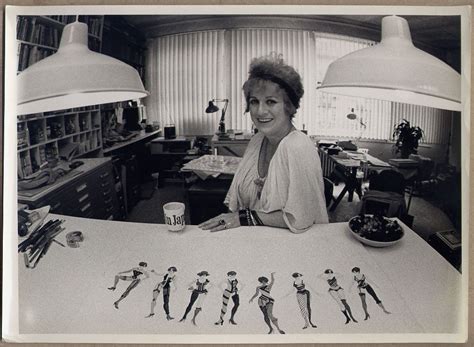A Quote by Patricia Field
I think the fashion industry, as a result of globalization, has undergone a uniformity. I'm not saying that's good or that's bad but that is my observation.
Quote Topics
Related Quotes
I think fashion is repulsive. The whole idea that someone else can make clothing that is supposed to be in style and make other people look good is ridiculous. It sickens me to think that there is an industry that plays to the low self-esteem of the general public. I would like the fashion industry to collapse.
Globalization is a bottom-up phenomenon with all actions initiated by milions of individuals, the sum total of which is globalization. No one is in charge, and no one can anticipate what the sum of all the individual initiatives will be before the result manifest. A global economy can only be the result of spontaneous order.
There's this famous observation that I totally believe: Great startup ideas are the ones that lie in the intersection of the Venn diagram of 'is a good idea' and 'looks like a bad idea.' So you want most people to think it's a bad idea and thus not compete with you until you get giant. But for it to secretly be good.
When it comes to partisan politics, everyone is a hypocrite. And all they care about is whether it hurts or helps them ... Is it good or bad for the Democrats? Is it good or bad for the Republicans? Is it good or bad for Jews, or good or bad for blacks, or is it good or bad for women? Is it good or bad for men? Is it good or bad for gays? That's the way people think about issues today. There is very little discussion of enduring principles.
Bad acting, like bad writing, has a remarkable uniformity, whether seen on the French, German, or English stages; it all seems modeled after two or three types, and those the least like types of good acting. The fault generally lies less in the bad imitation of a good model, than in the successful imitation of a bad model.
The silver lining of Brexit and Trump is that it has undermined the perception that globalization is an unstoppable force, whether or not we think it is a good thing or a bad thing. There have always been losers and as well as winners in this process, and cultural minorities have been among the most vulnerable losers. Now that sizable numbers of people in the most advanced economies have made their grievances felt in a fashion that is hard to ignore.
I think the twenty-first century happened, basically. That this century started on 9/11. And basically, it's been a century of counter reaction to globalization and the meritocracy. And a good century for 72 nations have gotten more authoritarian. We've had Brexit. We have Le Pen rising in France. We've just got a lot of these types all around the world. And the people who are suffering from globalization and the meritocracy are saying, "No more. You know, we get a voice too."
The film industry is a great industry, with infinite possibilities for good and bad. Its primary purpose is to entertain people. On the side, it can do many other things. It can popularize certain ideals, it can make education palatable. But in the long run, the judge who decides whether what it does is good or bad is the man or woman who attends the movies.

































